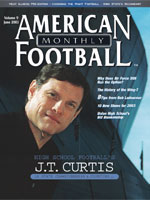AMERICAN FOOTBALL MONTHLY THE #1 RESOURCE FOR FOOTBALL COACHES
Article CategoriesAFM Magazine
|
How to Lose a Game© More from this issueEvery coach has that call he’d like to have back. It might be that defensive set on that goal-line stand that gave up the go-ahead score on third-and-goal from the five. Or that time he passed three times from inside his own 10 leading with less than two minutes left in game. If he’s lucky, maybe it’s one or two a season. Tulsa Union coach Bill Blankenship knows his share about losing, even though he hasn’t done that much of it in 11 seasons, going 116-23 with 11 playoff trips and five title game appearances (including his first championship in 2002). Blankenship hates failure so much he tries to remind himself and his staff about ways to avoid it by cataloging ideas that just weren’t so hot. “We kind of joke about this sometimes at clinics, but it’s really true. I have a file called ‘How to Lose Football Games.’ Over the years, you come back and say, ‘Oh, that was stupid.’ And you file that away, or ‘Oh, I never covered that.’ “You’ve got to remember. Over the years, you just put these things in the file and hopefully you don’t repeat them. If you just don’t repeat the same dumb mistakes, you have a chance to get better. I guess that’s what I’ve tried to do as a coach,” Blankenship said. Of course, sometimes losing is inevitable. Unless you’re somebody like De La Salle’s Bob Ladouceur, chances are good that somebody is going to hang an “L” on you sooner rather than later. Dealing with it sometimes isn’t easy, but putting it in perspective is important. Watching people put their life in danger in Iraq or having your own brush with mortality is a pretty quick reality check, says Blankenship. “Some of that is knowing the sun is going to come up the next day. I think early on in my career – even though I consider myself I man of faith and all that kind of stuff – I think I get really caught up in wins and losses. When I was in Spiro, I went through a bout with cancer, and that is a real wakeup call. “I can really credit a lot of that experience to do what you can, you put it all out on the table. It doesn’t diminish the hurt or the jubilation, but when it’s over, it’s over. It’s time to go to the next one. It’s a cliche, but there are a whole lot of things more important than what we’re doing. Hopefully, it’s what we’re learning and trying to do,” Blankenship said. A great staff can signifcantly reduce your stress, both in that they help you win more games and help you get over it when you don’t. Hire them wisely. “I put a lot of value on the chemistry of my staff. One of the things I had to learn is that I don’t need a lot of clones. I need the tough guy, I need the teddy bear. I need the youthful exhuberance and the gray-haired thinker. I really put a value on having a balance in the staff. “If you’re talking about leadership positions, coordinator positions, that’s a position of experience. When I have a chance to hire a staff guy, I wanna first look within my program. We’ve been able to move up several coaches through our junior high ranks and keep them involved. We do that every opportunity we can,” Blankenship said. “What I want, I feel like I can coach the coaches if they’re eager to learn and they’re coachable and if they can translate what I tell them to the players. I’d rather have that over experience, but if I can get that and experience, then we’ve got the right guy.” Mark Garner, a veteran of 17 years on Blankenship’s staff, points to his boss’ leadership on and off the field as a reason for their success. One of the biggest strides they’ve taken over time, says Garner, is improving the way they practice. “Every clinic we had a chance to go to we’d always go and learn. Our practice schedule, we’ve took our practice schedule and I don’t think anyone can touch how we practice. We never have one wasted moment. It’s constant movement, constant getting better. “Even in finally accomplishing the championship, we’ve got new things we want to accomplish, new goals, better ways to practice, better ways to do team, better ways to work our sophomores. Coach Blankenship was never anyone to set back on anything he did successfully. We’re always trying to find a way to get better, trying to improve. Trying to find a better way to practice, a better way to gameplan,” Garner said. As for clinic tips, Blankenship has one or two of his own. “Be a sponge ... but you have to go back and figure out what really works and what doesn’t for you. I just went every chance I could to any clinic, or if I had a guy coming through, try to get him on a napkin and X and O with him and just learn what he does best. My dad taught me this, he said, ‘You get with any coach, and you ask him what the one thing is he thinks he does best, he’ll usually tell you.’” Blankenship said. “So I loved, as President Bush would say, the ‘strategery’ of it. I love the Xs and Os part of trying to figure out the chess match. I wasn’t a great athlete, my head was my best weapon. So that is why I think I am fascinated with the learning part of the game.” |
|
| HOME |
MAGAZINE |
SUBSCRIBE | ONLINE COLUMNISTS | COACHING VIDEOS |
Copyright 2024, AmericanFootballMonthly.com
All Rights Reserved




